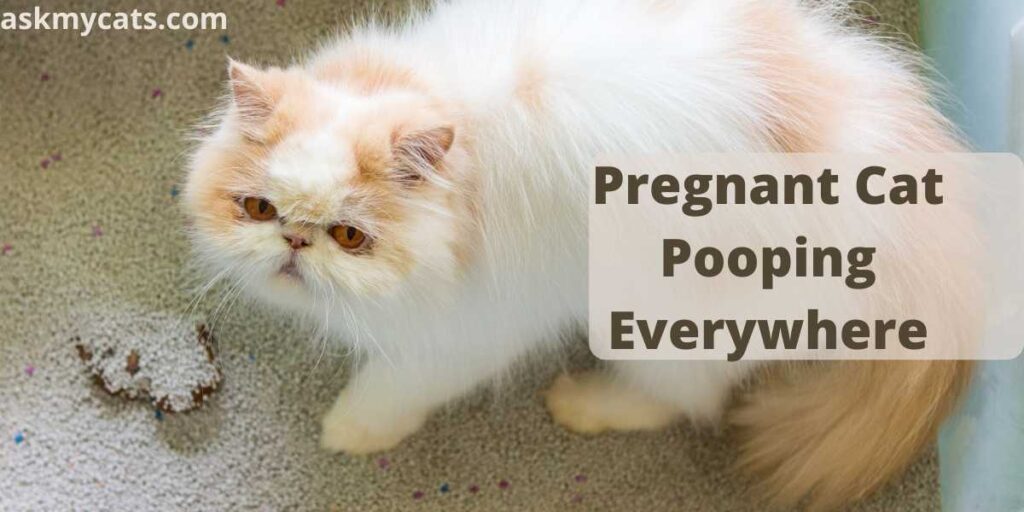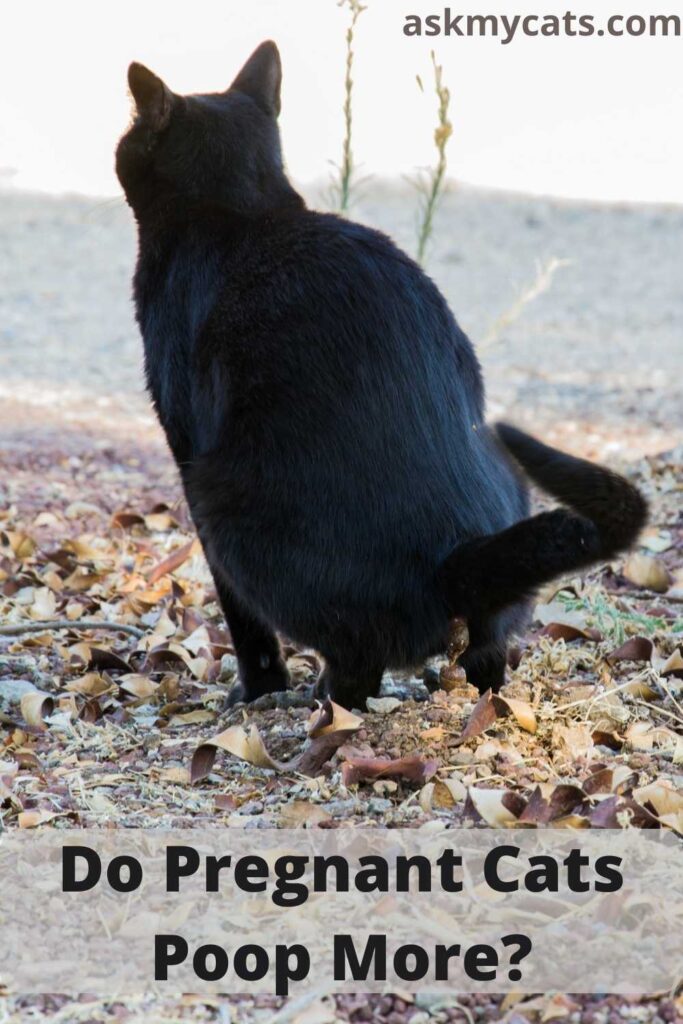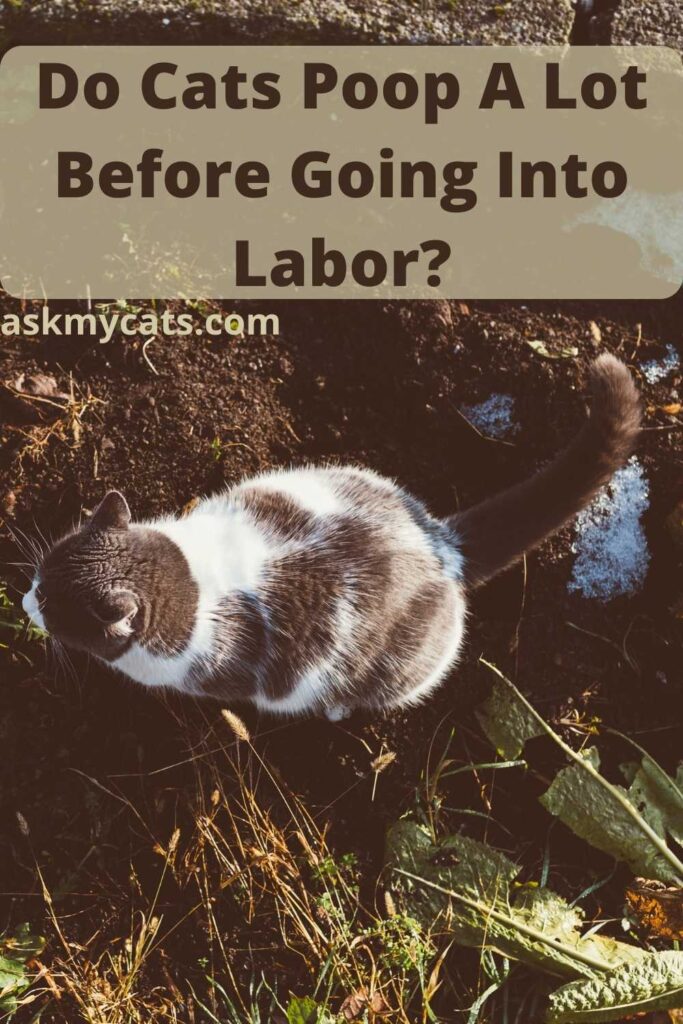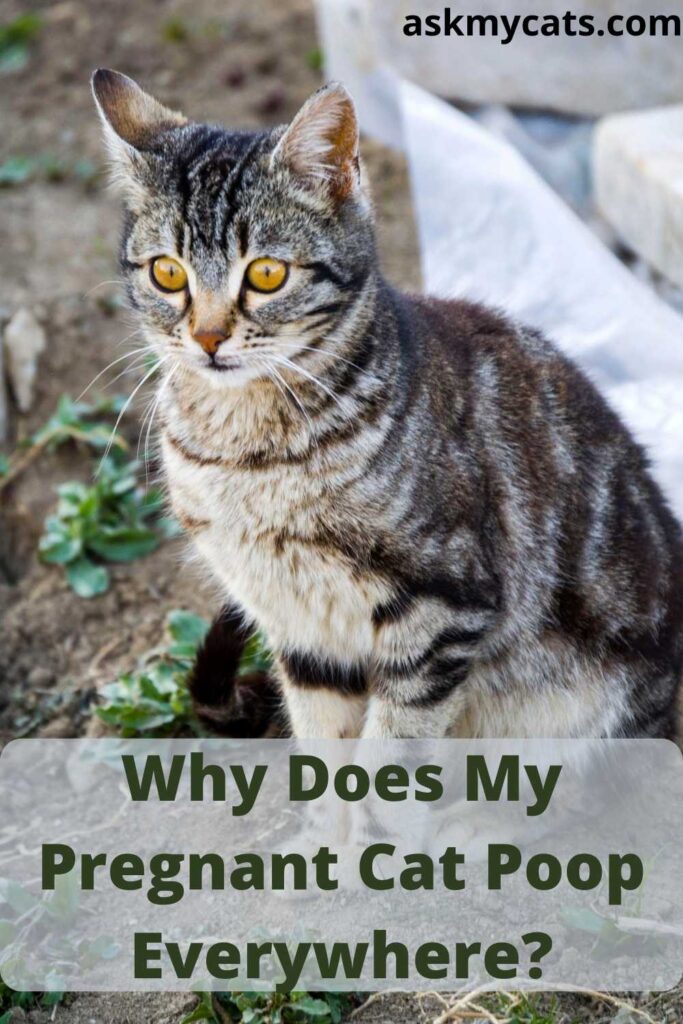Cats, unlike many other types of pets, have an almost instinctive ability to learn to use the bathroom in a specific location.
Litter box training comes naturally to cats, preventing unwanted late-night trips outside as well as the inevitable accidents that come with training other types of pets.
A pregnant cat pooping everywhere on a regular basis, on the other hand, can occasionally become an issue.
Fortunately, such problems frequently have an underlying cause. These issues can be resolved with treatment and patience.
So, why is your pregnant cat pooping everywhere?
There could be many underlying causes behind your pregnant cat pooping everywhere like, medical causes or territorial marking, etc.
Keep reading this article to know more about the reasons behind your pregnant cat pooping everywhere and how to avoid this.


Give Your Cat the Perfect Day
Get the Free Ebook!
Do Pregnant Cats Poop More?
Yes, pregnant cats poop more as they eat more.

From the day she mates until the end of her pregnancy, your pregnant cat’s food intake will gradually increase.
By the end of her term, she’ll have eaten about 50% more than usual (though it’s not uncommon for her to need up to twice as much!).
Fortunately, feeding pregnant cats is simple.
They’re usually reasonable as long as you provide enough food, eating only what they need and stopping when they’ve had enough.
Because kittens require additional nutrition during their early development, begin feeding your pregnant cat kitten formula as early as the fourth week of her pregnancy.
So, it is obvious that when the food intake increases, the poop frequency will also be on rise.
It’s possible that the kittens are pressing on her bladder, causing her to poop more frequently than usual.
It could also be the body’s hormones. It could also be that your cat is suffering from underlying urinary tract problems that you are unaware of.
So, it is best to get her checked by a certified vet.
Do Cats Poop A Lot Before Going Into Labor?
Although it is not necessary, some cats can poop a lot before going into labor because of diarrhea.

Cats frequently have diarrhea. It can occur due to a variety of factors, including pregnancy.
If your cat is pregnant, you must exercise extreme caution.
You should be concerned if she has diarrhea. It is possible that your cat will poop a lot before going into labor.
Diarrhea can result in loose or watery stools, as well as frequent bowel movements.
Diarrhea occurs when poop passes through the intestines too quickly. This can lead to more frequent pooping.
Pregnancy can be stressful for your cat’s body, resulting in diarrhea. If the only cause is stress, it should go away in a day or two.
If the condition does not improve or resolve, she may have intestinal parasites. Add 1-2 teaspoons of canned pumpkin (not the filling) to her food on a daily basis to add fiber and encourage hard stool formation.
If things do not improve, contact your veterinarian to see if they would like to see her for diarrhea treatment (depending on how far along she is).
Some medications and dewormers are safe to use in pregnant cats, while others are not.
Interesting Read: Do Cats Poop Out Of Spite?
Why Does My Pregnant Cat Poop Everywhere?
Here are some reasons why your pregnant cat could be pooping everywhere.

1. Medical Causes
Arthritis is a common disease that can cause a pregnant cat to poop on the floor rather than in the litter box or to pee over the edge of the litter box.
Lifting the back legs to step over and into the litter box can be painful if your pregnant cat has arthritis.
It can also be painful for a pregnant cat to sit up straight when pooping or peeing.
Pregnant cats will frequently poop near the litter box but will not step inside.
They may also exhibit other symptoms such as difficulty walking, difficulty jumping, or pain along the spine when petted.
Gastrointestinal (GI) disease is another medical reason for pooping outside the litter box. Pregnant cats frequently experience constipation.
Dehydration from renal disease, hyperthyroidism, megacolon, or other intestinal issues can all cause it.
Pregnant cats typically use the bathroom infrequently, strain to poop or pee, and have small, dry bowel movements.
On the other hand, diarrhea or loose stool will make it difficult to get to the litter box because the urge to go can come on suddenly. Diarrhea is frequently caused by GI infection and stress.
If your vet determines that the problem isn’t physiological, she’ll probably investigate whether your cat has a behavioral issue.
2. Territorial Marking
Territorial marking, also known as spraying, is very common in cats. Pooping or peeing in specific locations is a common way to communicate with other cats or creatures in the area.
Typically, the message is intended to avoid an unexpected meeting.
If another cat or animal, or even a new baby, has been introduced to the household, or if someone has moved in, out, or on, your pregnant cat may simply be marking its territory.
This should only be temporary until the pregnant cat adjusts to the new environment.
However, any change in a pregnant cat’s routine or environment can cause stress, which can lead to unusual behavior.
Marking with urine and occasionally poop is usually done in a visible, high-traffic area (e.g. the middle of the living room, a frequently-used couch).
Urine is frequently sprayed on vertical surfaces rather than the floor. This type of marking is also frequently done on or near a pet owner’s belongings (e.g. laundry, the bed).
It’s perfectly normal, especially when there’s a new critter in the house. Pregnant cats use body language and smell to communicate because they cannot speak.
Find out the reasons: My Cat Keeps Pooping On The Floor In The Same Spot
3. Reactionary Causes
Stress and anxiety, which are frequently associated with social issues in multi-cat households (especially when a new cat is introduced), are likely the most difficult reasons for inappropriate elimination to resolve.
A stressed or worried pregnant cat will poop or pee outside the litter box to surround herself with her own scent.
While that may seem strange to humans, having his own scent around gives him a stronger sense of security and confidence to deal with whatever is going on.
Many owners are concerned that this is done maliciously; a common example reported by veterinarians is a cat pooping on the floor following a veterinary visit.
Cats are notorious for turning up their noses at litter boxes that do not meet their exacting standards for cleanliness and odor.
If it isn’t spotless, even cats who have been litter-trained for years may reject the box in favor of another location (usually one that will get your attention).
Is your pregnant cat bothered by the location of the litter box? Consider moving it if it’s near a door or in a high-traffic area of the house that the cat can’t easily access.
This is not advised if your pregnant cat has dementia because it may cause further confusion.
Fear of the litter box can also be a reactionary cause of pooping or peeing outside the litter box.
If you use a new litter that your pregnant cat dislikes, clean the box with a new detergent (OR if you haven’t been cleaning the box), or use a fancy robot cleaning box that makes strange noises, your pregnant cat may avoid the box and go somewhere else.
Similarly, if the litter box is in an area where the pregnant cat does not feel safe going, such as within reach of a nosy puppy or toddler, she may use the bathroom in a new location that is more comfortable for her.
It may take a few weeks or months for a newly adopted pregnant cat to fully adjust and feel comfortable enough to reveal its personality.
It’s possible that your adoptive pregnant cat was initially hesitant to share the litter box but later changed its mind.
Interesting Read: Why Is My Cat Pooping On The Couch?
How Do I Stop My Pregnant Cat From Pooping In The House?
Here are some things you can do to stop your pregnant cat from pooping in the house: –
1. Rule Out Underlying Health Issues
The first and most important step is for your veterinarian to rule out any potential health issues.
When the health issue is resolved, most pregnant cats will resume using the litter box.
Keeping those annual wellness checks is a good way to prevent pooping outside the litter box in the future.
It is always recommended to do yearly blood work, as they get older, twice-yearly blood work. Regular check-ups can help detect these diseases early.
Check out interesting reasons behind Older Cat Pooping Outside Litter Box
2. Clean The Box
First and foremost, scoop clumps from the litter box on a daily basis and deep clean it on a regular basis.
This entails removing the old litter, scrubbing the empty box with mild dish soap and warm water, rinsing it with clean water, allowing it to air-dry, and replacing it with a new supply of clean, unscented litter (sometimes scented litter is unappealing to finicky cats).
Use rubber gloves and a face mask whenever you handle your cat’s litter box to protect yourself from microscopic bugs and litter dust.
3. Lock It Up
If your pregnant cat is drawn to a particular location, such as a bath mat, as a latrine, try to restrict its access to the room by installing a baby gate or closing/locking the door whenever possible.
Simultaneously, encourage your pregnant cat to use its litter box as intended by placing it far away from its food and water bowls in a quiet, private, and easily accessible location.
4. +1 Litter Box
If you’ve added a second cat, consider adding more litter boxes rather than forcing both cats to share a box.
One litter box for each cat plus one more is the ideal number. This means that if you have two cats, you should have three litter boxes available.
It should be noted that the boxes must be in completely different locations. Otherwise, one cat may try to “guard” and “own” all of the toilets, keeping the other cat at bay.
5. Put Up Obstacles
If your pregnant cat has been pooping in a particular area and you can’t block its access, try laying down aluminum foil or spraying the area with a kitty-safe deterrent.
The goal is to make the inconvenient area as unappealing to the cat as possible.
Examine the surface where your pregnant cat prefers to defecate and try to replicate it in the litter box.
If your pregnant cat prefers tile, leave the bottom of the litter box bare. If it’s going on paper, line the bottom of the box with paper; if it’s going on the carpet, put a carpet remnant in the box.
Frequently Asked Questions
Is it normal for cats to have runny poop?
Cats frequently have runny poop. This, however, does not imply that it is normal. It’s critical to understand what healthy poop and diarrhea look like so you can spot potential issues with your favorite feline.
It’s probably the last thing on your mind, but your cat’s poop can reveal a lot about its health.
Cat poop is typically dark brown and firm. It should not be firm, but rather solid. It may have an odor, but it should not be overpowering or unpleasant.
How to diagnose a cat’s litter problems?
If your cat continues to eliminate outside of her litter box, take her to the doctor to determine the cause and treatment options.
Your veterinarian should perform a thorough physical examination, full blood count, blood chemistry panel, and urinalysis on your cat.
Litter box training may be required to return her to regular behaviors after she has been treated for medical issues. Make sure to compliment her every time she uses her litter box correctly.
How to clean cat poop from carpets, beds, or couches?
To remove poop stains and their odor, veterinarians recommend enzyme-based cleaners. Enzymes work by breaking down the molecules in poop, making it easier to clean.
And, rather than simply masking the odor, they break it down and eliminate it. Enzymatic cleaners can be used on a variety of surfaces, making them convenient to use.
Final Words
If you notice your pregnant cat is pooping everywhere, the best course of action would be to bring her to the vet to rule out any medical issues. After that, you can work on getting her back to pooping the litter box.
If you have any questions, ask us in the comments section.
Must Read: Home Remedies To Stop Cats From Pooping On Floor
